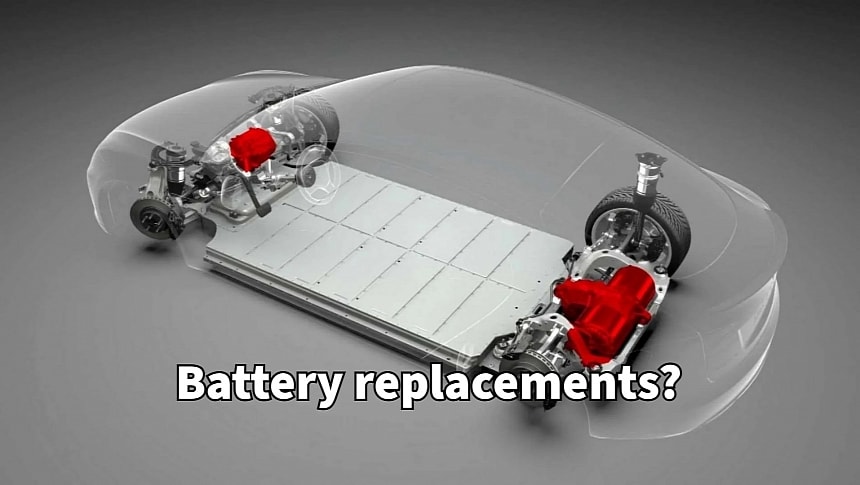One of the most widespread urban legends claims electric vehicles are not worth the money because their batteries will wear out, and a replacement is too expensive to make sense. However, a recent study shows that battery failures have been exceedingly rare, especially after Tesla solved the Model S's battery problems starting with the 2016 model year.
There are many reasons why electric vehicles are still not seen as the best replacement for ICE vehicles today. Some people mention their higher price, while others are more concerned by the limited range and the long time they take to charge. While these are valid concerns, people also have fears that are sometimes speculated by anti-EV propaganda. Among those fears are EV batteries catching fires and EV batteries wearing out or failing.
Studies have already demonstrated that electric vehicles are much less likely to catch fire than combustion vehicles. However, replacing a battery pack due to a malfunction or simply wear and tear is still a major concern for many people. Studies are less relevant in this case, considering that electric vehicles are still new on the market, and the manufacturer's warranty covers most battery packs. Most electric cars that are now in use have been produced in the past three years, which means they have improved battery chemistry and thermal management.
Modern lithium-ion batteries are a lot better than those installed in early electric vehicles like the Nissan Leaf and the original Tesla Model S. A Recurrent study cited by the DOE's Vehicle Technologies Office shows that EV battery replacements have been exceedingly rare since model year 2015. Battery failures have been more frequent between 2011 and 2015, mostly because the Li-ion battery tech was not refined enough.
Surprisingly, Tesla has been responsible for many battery replacements due to failure (outside recalls). The culprit was the 2012-2015 Model S, whose battery pack was prone to failure. When specific cells in the battery pack died, the dreaded BMS_u029 error code appeared in the dashboard, prompting a battery pack replacement. For many, this happened soon after the warranty expired, leaving them with huge battery replacement bills.
These failures are evidenced in the latest Recurrent study about EV battery failures. While the 2011 model year numbers are high mostly because of the failures of the Nissan Leaf batteries, 2012-2015 battery replacements are caused mainly by the Tesla Model S's issues. The same study shows that once Tesla solved the Model S battery issues, replacements due to failures (outside of recalls) became quite unusual, at under 0.5%. Even better, the manufacturer's warranty would cover most of these replacements.
Much higher replacement rates have been caused by battery recalls, with the peak in 2017 (11%) when most of the Chevrolet Bolt EVs have been recalled to replace the battery packs. Hyundai Kona EV also added to those numbers, which is why 2018-2020 numbers are also high.
Studies have already demonstrated that electric vehicles are much less likely to catch fire than combustion vehicles. However, replacing a battery pack due to a malfunction or simply wear and tear is still a major concern for many people. Studies are less relevant in this case, considering that electric vehicles are still new on the market, and the manufacturer's warranty covers most battery packs. Most electric cars that are now in use have been produced in the past three years, which means they have improved battery chemistry and thermal management.
Modern lithium-ion batteries are a lot better than those installed in early electric vehicles like the Nissan Leaf and the original Tesla Model S. A Recurrent study cited by the DOE's Vehicle Technologies Office shows that EV battery replacements have been exceedingly rare since model year 2015. Battery failures have been more frequent between 2011 and 2015, mostly because the Li-ion battery tech was not refined enough.
Surprisingly, Tesla has been responsible for many battery replacements due to failure (outside recalls). The culprit was the 2012-2015 Model S, whose battery pack was prone to failure. When specific cells in the battery pack died, the dreaded BMS_u029 error code appeared in the dashboard, prompting a battery pack replacement. For many, this happened soon after the warranty expired, leaving them with huge battery replacement bills.
These failures are evidenced in the latest Recurrent study about EV battery failures. While the 2011 model year numbers are high mostly because of the failures of the Nissan Leaf batteries, 2012-2015 battery replacements are caused mainly by the Tesla Model S's issues. The same study shows that once Tesla solved the Model S battery issues, replacements due to failures (outside of recalls) became quite unusual, at under 0.5%. Even better, the manufacturer's warranty would cover most of these replacements.
Much higher replacement rates have been caused by battery recalls, with the peak in 2017 (11%) when most of the Chevrolet Bolt EVs have been recalled to replace the battery packs. Hyundai Kona EV also added to those numbers, which is why 2018-2020 numbers are also high.







